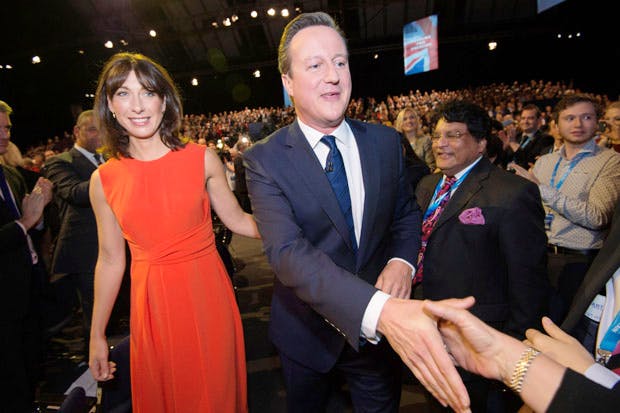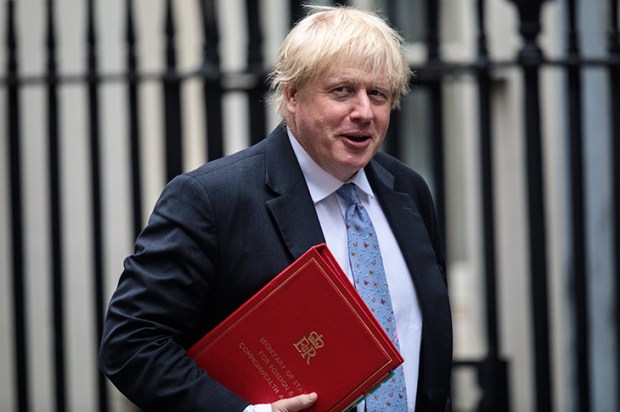Post-election party conferences usually follow a standard pattern. The winning party slaps itself on the back while the losers fret about how to put together an election-winning coalition. But this year, there’s been no talk of compromise or coalition from Labour. They seem happy to be a protest party, unbothered that voters disagree with them on the economy, welfare and immigration. And the Tories, instead of relaxing or moving to the right, have obsessed anxiously about how to broaden their appeal, to make their majority permanent.
This determination to look for new converts is a product of the election campaign. Weeks of looking at polls that indicated they were on course for defeat served as a near- death experience for the Tories. They began to accept that the party needed to expand its electoral base.
One of the usual Tory articles of faith is that anyone can pull themselves up by their own bootstraps, that if you work hard, you will get on. But Cameron chose to challenge that in his conference speech: some people in this country have been refused job interviews, he said, just because of their surname. It’s what he believes — inside No. 10, it’s fashionable to quote Martin Luther King: ‘It’s all right to tell a man to lift himself by his own bootstraps, but it is a cruel jest to say to a bootless man that he ought to lift himself by his own bootstraps.’ But it was also a way of courting ethnic minority voters, who tend to vote Labour.
It wasn’t just Cameron who was banging the one-nation drum. Those who want to succeed him were at it as well. George Osborne talked about the need to show the millions of working people who voted Labour in May that the Tories are ‘on their side’. Boris Johnson argued, in language one can’t imagine Margaret Thatcher ever using, that ‘our lives are really a gigantic collective effort’. Even Theresa May’s diatribe against immigration was based on the effect that it has on low-income workers.
This attempt to reposition the Tories might be being led from the conference stage, but the party itself has changed, perhaps because so many activists left over gay marriage. In 1981, it squealed with delight when Edwina Currie brandished a pair of handcuffs to the conference hall to demonstrate her tough-on-crime credentials. This year, it gave a heartfelt standing ovation to Michael Gove for arguing for prisoner rehabilitation because ‘we should not compel those who have made mistakes to live lives forever defined by those mistakes’.
The Tories know that their luck won’t last for ever, that Labour will at some point drop Jeremy Corbyn as leader. But they believe that his election has given them a once-in-a-generation opportunity to redefine politics. A confidant of David Cameron purrs that this focus shows that the Tories are, once again, serious about power.
Only Europe threatens this Tory harmony. Cameron’s pre-election promise means that there must be a referendum on Britain’s membership of the European Union before the end of 2017.
A major worry for those involved in Cameron’s EU renegotiation is that expectations for what he can achieve are too high — especially given the lack of progress so far.
The refugee crisis has given many hope that Cameron might win back some power over the EU’s freedom of movement rules. But one of those involved in the renegotiation complains, ‘Some cabinet ministers think everything is changing, that it’ll all be a lot easier now. But that’s not what we’re finding.’
At the top of the Tory party there is a recognition that the biggest challenge for Cameron’s successor will be putting the party back together again after the referendum. There is an acceptance that they are bound to be divided on this issue, hence the decision for the party itself to remain neutral during the campaign. Even those in the cabinet who are keenest on staying in the EU believe that at least a third of Tory MPs will back leaving.
To complicate matters, the Europe question is now tangled up with the whole succession issue. When asked to explain May’s speech on immigration, several of Cameron’s staff offered the same explanation: she’s gearing up to lead the Out campaign, they said.
Whether or not this is May’s intention, the fact that her speech was seen through this prism by senior Downing Street figures is in itself revealing. Boris Johnson is also reserving his options on Europe. He is not a natural Outer — his father was an MEP and his maternal grandfather was president of the European Commission on Human Rights — but he has always been clear that his position come the referendum will be determined by how successful he thinks the renegotiation has been. Intriguingly, on Tuesday he chose to set a bar he must know Cameron will not get over, declaring: ‘It should be up to this Parliament and this country — not to Jean-Claude Juncker — to decide if too many people are coming here.’
There are those who see a benefit in the Tories being split on Europe. One cabinet minister, who is almost certain to campaign for Out, argues that the Tories should want people at the top of both campaigns. He claims that this is the best way to ensure that the referendum doesn’t lead to a surge in support for Ukip.
Labour’s lurch to the unelectable left means that we could be at the start of a decade or more of Tory majority rule. But for that to happen, the party will have to stay together after the EU referendum. This week suggests that the Tories’ desire for power should serve as grounds for a reconciliation.
Got something to add? Join the discussion and comment below.
Get 10 issues for just $10
Subscribe to The Spectator Australia today for the next 10 magazine issues, plus full online access, for just $10.















Comments
Don't miss out
Join the conversation with other Spectator Australia readers. Subscribe to leave a comment.
SUBSCRIBEAlready a subscriber? Log in